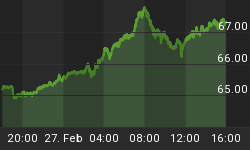According to Fortune (citing IMF data), Germany's banks are now more leveraged than Lehman Brothers at the time of its collapse (Lehman: 31 to 1). Similarly, their leverage is financed by "cheap, short-term loans that are vulnerable to a market shock." These loans (as we explained last December) are from money market funds here in the U.S. (Investors should Buy Treasury Bills instead.)
According to Fitch, "Forty-four percent of money market mutual fund assets in the U.S. are invested in the short-term debt of European banks." Last February, we shared a Bloomberg table which showed European bank exposure to Portugal, Ireland, Greece and Spain. The worst of these is obviously Greece. Greek loans have been continuously falling in value and some currently trade at roughly 40 cents on the dollar.
***More For Clients & Subscribers - Subscribe To The Investment Analysis Report or View Our Archives ***
For U.S. investors, this is not going to end well. Their funds will be lost (or held up in a money market fund wind down/bailout) as European banks fail. And as Reuters is reporting, "Up to one in six European banks is set to fail an EU-wide financial health check..."
The 'Ultimate' Dollar Bear Turns Bullish
Last month, we mentioned that Jim Grant had changed his U.S. Dollar outlook. This month, "The Ultimate Dollar Bear" Jim Rogers on Bloomberg Television's "Surveillance Midday" (a must watch video) reveals that he is long the U.S. dollar. How bearish has Jim been on the U.S. dollar? In 2007, he sold his house in New York, moved to Singapore and has been teaching his daughters Mandarin (i.e. pretty bearish). But now he is buying U.S. dollars. He explained his reason to Bloomberg; "Because everybody is bearish, including me. I read that something like 97% of people are bearish on the dollar. I am one of those ninety-seven. So I bought dollars."
While Grant and Rogers are advising U.S. dollars, the Wall Street Journal reports: "financial advisors increasingly are telling their clients" to move "cash and shorter-term assets into foreign currencies and bonds." This is an easy sell for Wall Street as "clients have become more receptive recently as they digest the risks of owning only dollars and the impact that could have on living standards over time."
So on one side of the trade, Jim Rogers is buying U.S. dollars. As a reminder, Jim Rogers' Quantum fund (with the assistance of his partner George Soros) earned 4200% over 10 years. And on the other side of the trade (doing the complete opposite of Jim i.e. getting rid of their dollars), you have Wall Street's customers. Historically, these customers look at past performance, rush to give Wall Street their funds and are almost always left holding losses. How will this all turn out?
We may have a hint as the Canadian dollar is already down 4% in the last two months. (See Japanese homemaker-traders from 2007 and the subsequent performance of the Yen if you can't wait for the conclusion of this particular episode.)
Meanwhile, AFLAC has just reported a $610M loss on European bank investments. Their reasoning for their investment was the same as Wall Street's customers as they admitted to "a search for yield." As we stated last October, "Seek value, Do not chase yield."
"We always have risk. The world is full of banana peels - that goes without saying. The difference today, across a range of markets is that you are not getting compensated for the risks that we face and the Fed itself is helping to create these risks through the manipulation and suppression of interest rates." - Jim Grant
"Holding cash is uncomfortable, but not as uncomfortable as doing something stupid." - Warren Buffett
Full Disclosure: Paul J. Lamont holds U.S. Treasury Bills and a bearish S&P500 option position.
At Lamont Trading Advisors, we provide wealth preservation strategies for our clients. For more information, feel free to contact us. Our monthly Investment Analysis Report requires a subscription fee of $40 a month. Current subscribers are allowed to freely distribute this report with proper attribution.
***No graph, chart, formula or other device offered can in and of itself be used to make trading decisions. This newsletter should not be construed as personal investment advice. It is for informational purposes only.
















